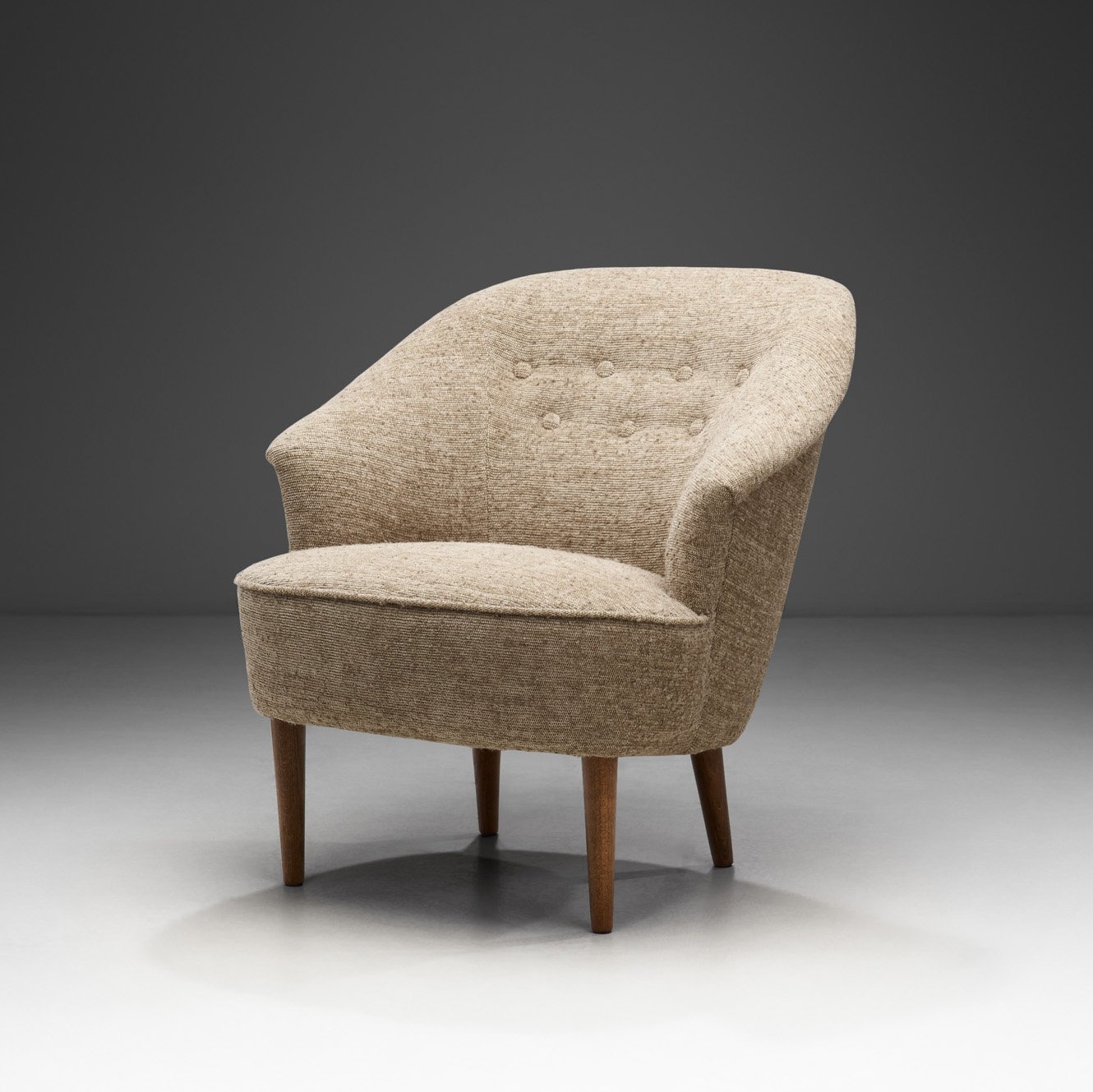Fritz Hansen Model "No. 1669" Wingback Chair with Stained Beech Legs, Denmark 1940s














Fritz Hansen Model "No. 1669" Wingback Chair with Stained Beech Legs, Denmark 1940s
REQUEST PRICE HERE
Price category: 7,500 - 10,000 usd / eur
Throughout Scandinavia, there's a long history of pride in craftsmanship which is especially true for Denmark and one of its most reputable furniture makers, Fritz Hansen. This beautiful high-back chair is an exceptional flagbearer of Danish Mid-Century Modernism with immediately recognizable curves and quality.
When the Copenhagen-based furniture maker, Fritz Hansen opened for business more than 140 years ago, the company adhered to the traditional, time-honoured Danish values of craftsmanship in woodworking and joinery. Yet thanks to the postwar innovations of Arne Jacobsen and others, Fritz Hansen would become the country’s leader in Scandinavian modern design using new, forward-looking materials and methods. This “Model 1669” chair is a great representation of this sentiment with a distinctive design defined by the curving “wings” on the back and similarly curved arms. With both the back and arms curving outwards, the chair appears very open and cosy. The light, premium upholstery elevates these curves even further, with stylish button tufting and a horizontal pattern that results from the fabric’s characteristics. The dark stained beech front, and splayed back legs add traditional organicity, and contrast to the upholstery. Danish modernist furniture designs, such as this wingback chair, became known for their sober character and undecorated elegance. Accordingly, the main decorative element is the design itself, aided by quality materials and craftsmanship.
This model was first seen in Fritz Hansen's 1942 catalogue. Fritz Hansen started his company in 1872, and have become the manufacturer of some of the most emblematic chairs of the mid-20th-century. Like this model, beautifully crafted, functional designs characterize their work that are both timeless and timely.
Condition:
In good vintage condition. Wear consistent with age and use. The chair has been reupholstered recently in a premium fabric. Each of our items can be re-upholstered by our in-house atelier in a fabric of choice. Please reach out for more information.
Dimensions:
29.52 in W x 31.88 in D x 34.05 in H; Seat height 14.96 in; Arm height 20.66 in
75 cm W x 81 cm 86.5 cm H; Seat height 38 cm; Arm height 52.5 cm
Literature:
Fritz Hansen factory catalogue, 1942, p. 17, p. 19.
About the designer:
Fritz Hansen started his company in 1872, specializing in the manufacture of small furniture parts. In 1915, the firm became the first in Denmark to make chairs using steam-bent wood (a technique most familiar from birch used in the ubiquitous café chairs by Austrian maker Thonet). At the time, Fritz Hansen was best known for seating that featured curved legs and curlicue splats and referenced 18th-century Chippendale designs.
In the next few decades, the company promoted simple, plain chairs with slatted backs and cane or rush seats designed by such proto-modernist masters as Kaare Klint and Søren Hansen. Still, the most aesthetically striking piece Fritz Hansen produced in the first half of the 20th century was arguably the China chair of 1944 by Hans Wegner. Everything changed in 1952 with Arne Jacobsen’s Ant chair which was the breakthrough. Its silhouette suggests the shape of the insect’s body, and the lightweight, stackable chair and its biomorphic form became an international hit.
The Egg and Swan chair models led Fritz Hansen to fully embrace new man-made materials like foam, plastic, and steel wire, used to realize the avant-garde creations of later generations of designers with whom the firm collaborated, such as Piet Hein, Jørn Utzon (the architect of the Sydney Opera House) and Verner Panton. If the Fritz Hansen of 1872 would not now recognize his company, today’s connoisseurs certainly do.












